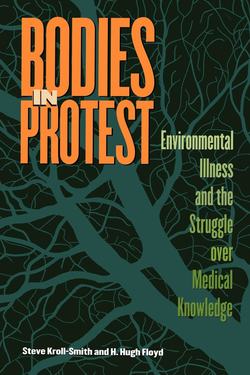Читать книгу Bodies in Protest - Steve Kroll-Smith - Страница 8
На сайте Литреса книга снята с продажи.
Preface
ОглавлениеAnother pandemic illness is emerging in American society. It is called, among other things, multiple chemical sensitivity (MCS), environmental illness (EI), and somewhat ominously, twentieth-century disease. It invites comparison with that most deadly modern pandemic, AIDS. In two important respects the terms multiple chemical sensitivity and acquired immunodeficiency syndrome are alike. In a strict sense, neither term denotes a disease at all. They both refer to medical conditions that are expressed in a complex array of symptoms and disorders. One person with MCS, for example, may experience memory loss and fatigue, while another breaks out in skin wheals and loses motor control. An AIDS patient, on the other hand, is vulnerable to a number of cancers or may succumb to pneumonia.
A second feature shared by MCS and AIDS is their common origin in environments, albeit quite different ones. It appears that HIV, the human immunodeficiency virus that causes AIDS, was confined to African rain forests until liberated by commercial deforestation practices. Indeed, Ebola, Marburg, and AIDS are, by all accounts, tropical viruses that would likely live in rain forests at no risk to humans if the forests were left uncultivated. Likewise, MCS is apparently caused by human intervention into environments. But, unlike AIDS, it is not an infectious agent freed from ancient ecosystems to hunt for human hosts. Instead, the commodities of late capitalist society, built environments, and consumer goods have unleashed this new pandemic. MCS is not a virus in search of a remedy; it is, to risk the charge of hyperbole, a somatic indictment of modernity.
While an antidote for the AIDS virus continues to elude biomedical science, it is expected that one (or more) will be discovered. The shared expectation that a drug will be found to kill the virus originates in the consensus of the medical community and the wider society that AIDS is a pathophysiological problem that falls within the boundaries of normal medicine. While the disease is an uncontested modern catastrophe, a solution to AIDS will be found without radically modifying the biomedical model. Since AIDS is successfully captured within the biomedical system, it is not likely to upset essential political and industrial arrangements. The disease, after all, is transmitted via bodily fluids and befalls individuals who make poor choices or are victims of the poor or negligent choices made by others. The tortured body of AIDS is among our modern nightmares, but it is not a new body; we understand it, even if we cannot at present cure it.
The bodies of the multiply chemically sensitive, in contrast, are medical anomalies. While the biomedical community quickly apprehended AIDS, defining it in manageable terms, MCS is demanding that the biomedical model itself change to accommodate its peculiar etiology and pathophysiology. People with MCS, for example, believe that their illness has little to do with contaminating bodily fluids but is caused, rather, by seemingly benign consumer products and supposedly safe places such as houses, car interiors, and offices. Barely discernible amounts of chemical irritants found almost anywhere in modern society can permanently change their bodies, rendering them physically unstable and emotionally exhausted. An antidote for MCS, therefore, is not likely to be found through pharmaceutical research or invasive surgeries; nothing less than changing conventional understandings of what are safe and dangerous places and things found in them will abate this illness.
Moreover, MCS is a relational illness in a way that AIDS is not. The term relational illness simply means the degree to which debilitating symptoms are believed to be caused in part by the personal habits and routines of people who live or work in the social circles occupied by sick people. While caring for an AIDS patient may require people to change their customs and habits, those customs and habits are not considered the causes or triggers of immunodeficiency symptoms. People with MCS, on the other hand, believe that at any moment their relative state of illness or wellness is a function, in part, of the activities and practices of others. Important, perhaps critical, to a person’s management of MCS is her ability to persuade other people that they are partly responsible for her misery and must change if she is to successfully manage her symptoms. People with MCS must narrate their illness stories in order to survive.
Listen to the etiology stories and related narratives of the environmentally ill, and you will hear a new talk about a new body and its relationships to local environments. Observe their efforts to manage symptoms and pay attention to how they would rearrange the social and physical world to accommodate their disability, and you will witness the transformation of discourse into rhetoric. Ask questions about the significance of nonphysicians constructing medical explanations for their physical symptoms and miseries, and a broader, more inclusive trend in contemporary society may be discerned, one in which ordinary people are borrowing expert rhetorics, locating them in nonexpert systems, and working to politicize what is routinely considered natural.
Ironically, while AIDS will, at least in the near future, continue to devastate our lives, killing our lovers, spouses, friends, and acquaintances and mocking our weak and ineffectual attempts to control it, this most devastating of pandemics is not likely to result in profound political and industrial change. MCS, on the other hand, will claim few (if any) lives, but it will lay claim to an alternative strategy for the construction of rational knowledge in late modern society.
